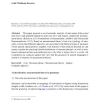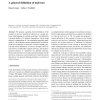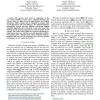1312 search results - page 208 / 263 » Quantitative Comparison of Languages |
KI
2010
Springer
13 years 8 months ago
2010
Springer
Abstract. Unlike people, household robots cannot rely on commonsense knowledge when accomplishing everyday tasks. We believe that this is one of the reasons why they perform poorly...
SYNTHESE
2010
13 years 8 months ago
2010
This paper presents a novel semantic analysis of unit names (like pound and meter) and gradable adjectives (like tall, short and happy), inspired by measurement theory (Krantz et a...
TPLP
2010
13 years 8 months ago
2010
In this paper we explore the use of Answer Set Programming (ASP) to formalize, and reason about, psychological knowledge. In the field of psychology, a considerable amount of kno...
VIROLOGY
2010
13 years 8 months ago
2010
We propose a general, formal definition of the concept of malware (malicious software) as a single sentence in the language of a certain modal logic. Our definition al thanks to it...
IMCSIT
2010
13 years 7 months ago
2010
The present work covers a comparison of the text retrieval qualities of open source relational databases and Lucene, which is a full text search engine library, over English docume...



